MIND Matters
WINTER 2023





































SPECIAL FEATURE









IN THIS ISSUE
Microglia replacement as a future treatment for neurodegenerative diseases?
Lecanemab and Donanemab: a tale of two drugs



HD-CARE celebrates 10 years




2022 Gala and the establishment of new endowed chair
Funding to support the next generation of scientists
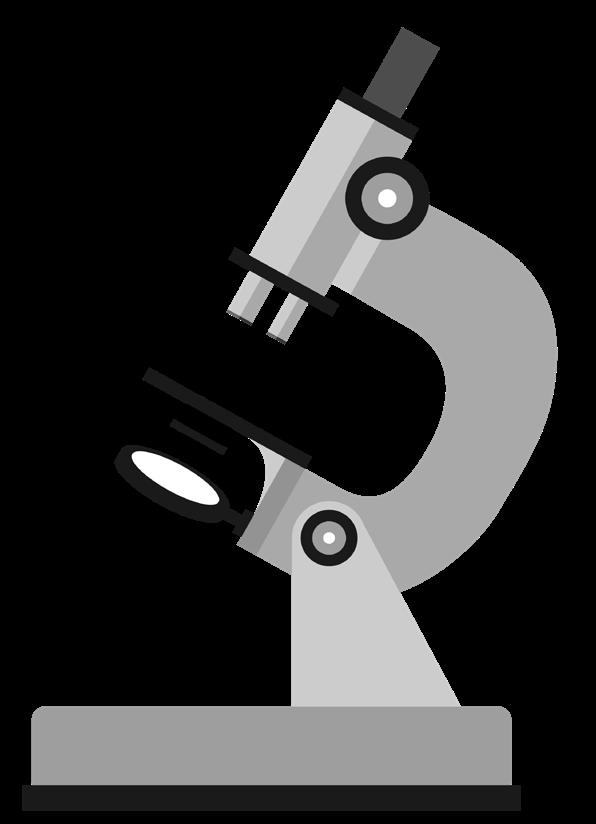
Meet Milagros Rangel and Malia Tano
Research opportunity for adults with Down syndrome


Microglia replacement as a future treatment for neurodegenerative diseases?

The Blurton-Jones lab created new healthy microglia that carry a specific mutation to resist a drug called Plexxikon, a CSF1R inhibitor, to replace damaged microglial cells in the brain with healthy ones.
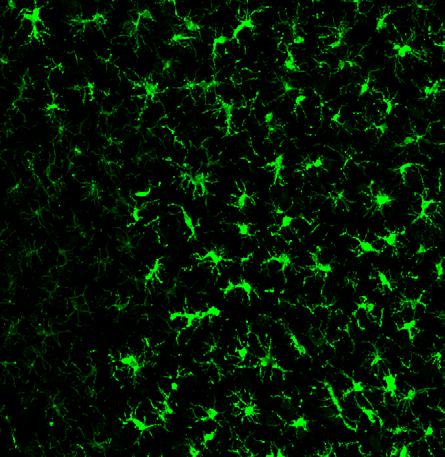
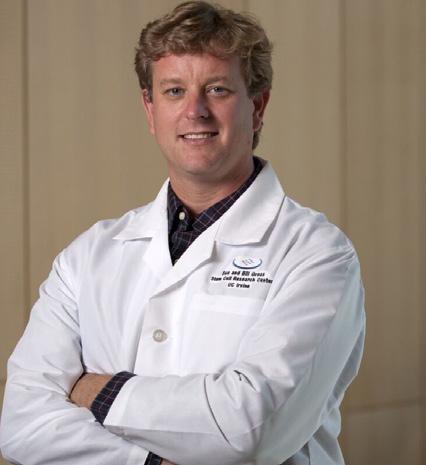
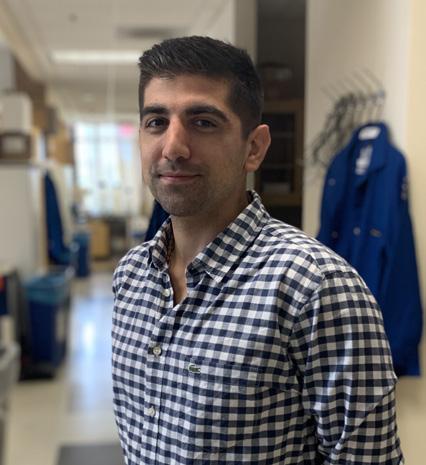
The term, “mutant microglia” might conjure images of destructive shapeless entities devouring entire city blocks, something like you might see in The Blob. But what if, instead of devouring city blocks, the blob was microscopic and it could be programmed to fight brain disease? Research from the Blurton-Jones lab, in collaboration with a team from the University of Pennsylvania, has shown that mutant microglia might actually one day play a therapeutic role in fighting neurodegenerative disorders like Alzheimer’s disease.
Microglia play a key role in brain health. They are the immune cells of the brain and emerging research, including work done at UCI MIND, has revealed that microglia are also implicated in the pathological progression of several neurological disorders, including Alzheimer’s disease. In a diseased state, microglia can become dysfunctional and may even contribute to further damage to brain tissue.
continued on page 6
Mathew Blurton-Jones, PhD (top left)| Jean Paul Chadarevian PhD Student (top right) Image of G795A microglia : Courtesy of Chadavarevian et al., Journal of Experimental Medicine, 2022 (bottom)
Dear Friends of UCI MIND,
Advances in the field of Alzheimer’s disease (AD) research and the contributions of UCI MIND investigators remain tremendously exciting. Two new drugs have been approved by the FDA (page 3). These approvals are believed by many to represent the dawn of a new age in AD research and treatment. Both drugs received accelerated approval and we await a decision from the FDA about “full approval” for lecanemab. If received, full approval could cause the Centers for Medicare and Medicaid Services to revisit their previous coverage decision about anti-amyloid antibody therapies. These events will be key to more fully understanding how these new drugs will change the care of people living with AD.
Even in the best case scenario of full approval and coverage, these drugs slow but do not stop disease progression and target only one of the signature brain changes that occur in AD. And for other brain diseases that cause dementia, such as Huntington’s disease, even fewer options exist (page 4). Thus, exciting work like that happening in the laboratory
Faculty members
Anatomy & Neurobiology
Aileen Anderson, PhD
Tallie Baram, MD, PhD
Christine Gall, PhD, Chair
Alan Goldin, MD, PhD
Kei Igarashi, PhD
Gary Lynch, PhD
Steven Schreiber, MD
John Weiss, MD, PhD
Xiangmin Xu, PhD
Biological Chemistry
Wei Li, PhD
Biomedical Engineering
Gregory Brewer, PhD
Chemistry
James Nowick, PhD
Xiaoyu Shi, PhD
Developmental & Cell Biology
Edwin Monuki, MD, PhD
Ali Mortazavi, PhD
Diane O’Dowd, PhD
Xiaoyu Shi, PhD
Environmental and Occupational Health
Masashi Kitazawa, PhD
Karen Lincoln, PhD, MSW, MA, FGSA
of Dr. Mathew Blurton-Jones (page 1) is urgently pursuing innovative treatment approaches that build on our growing understanding of disease pathophysiology.
This research is arduous and expensive. “Breakthroughs” come after years of deliberate efforts in the lab and the clinic. In addition to performing cutting edge research, we are committed to giving a next generation of scientists and clinicians the tools to carry on this important work. That is why we are so grateful to Joan and Don Beall for their support in UCI MIND’s training mission (page 6). Indeed, support from philanthropists like the Beall’s and Carla and Arthur Liggett, MD (page 5) propel us forward faster in training and research, toward eventual solutions for brain disease.
Epidemiology
Maria Corrada, ScD
Karen Edwards, PhD, Chair
Daniel Gillen, PhD
Sunmin Lee, ScD

Medicine
Masashi Kitazawa, PhD
Steven Tam, MD
Microbiology & Molecular Genetics
Emiliana Borrelli, PhD
Alan Goldin, MD, PhD
Molecular Biology & Biochemistry
Charles Glabe, PhD
Andrea Tenner, PhD
Neurobiology & Behavior
Mathew Blurton-Jones, PhD
Jorge Busciglio, PhD
Carl Cotman, PhD
Christine Gall, PhD
Kim Green, PhD
Joshua Grill, PhD
Claudia Kawas, MD
Frank LaFerla, PhD, Dean
Michael Leon, PhD
Craig Stark, PhD
Vivek Swarup, PhD
Leslie Thompson, PhD
Marcelo Wood, PhD, Chair
Michael Yassa, PhD
Neurology
Tallie Baram, MD, PhD
Maria Corrada, ScD
Carl Cotman, PhD
David Cribbs, PhD
Mark Fisher, MD
Lisa Flanagan, PhD
Claire Henchcliffe, MD, DPhil, Chair
Brian Hitt, MD, PhD

Claudia Kawas, MD
Albert La Spada, MD, PhD
Ira Lott, MD
Mark Mapstone, PhD
Tahseen Mozaffar, MD
S. Ahmad Sajjadi, MD, PhD
Steven Schreiber, MD
Gaby Thai, MD
John Weiss, MD, PhD
Michael Yassa, PhD
Pathology & Laboratory Medicine
Elizabeth Head, PhD, Vice Chair
Ronald Kim, MD
Albert La Spada, MD, PhD
Edwin Monuki, MD, PhD, Chair
Mari Perez-Rosendahl, MD
William Yong, MD
Pediatrics
Tallie Baram, MD, PhD
Virginia Kimonis, MD
Ira Lott, MD
Andre Obenaus, PhD
Joshua D. Grill, PhD Director, UCI MIND
Pharmaceutical Sciences
Emiliana Borrelli, PhD
Physical Medicine & Rehabilitation
Aileen Anderson, PhD
Brian Cummings, PhD
Physiology & Biophysics
Kevin Beier, PhD
Alan Goldin, MD, PhD
Psychiatry & Human Behavior
Joshua Grill, PhD
Gary Lynch, PhD
Bryce Mander, PhD
Joan Steffan, PhD
David Sultzer, MD
Leslie Thompson, PhD
Michael Yassa, PhD
Psychological Science
Daniel Nation, PhD
Radiation Oncology
Charles Limoli, PhD
Statistics
Daniel Gillen, PhD, Chair
Bin Nan, PhD
2 // mind.uci.edu
For the latest news,
MESSAGE FROM THE DIRECTOR
stories, and resources, visit mind.uci.edu/blog
To learn more about the AHEAD study, visit mind.uci.edu/participate
Lecanemab and Donanemab: A Tale of Two Drugs

In January, the US Food and Drug Administration (FDA) granted accelerated approval to lecanemab, a monoclonal antibody against the beta amyloid protein that accumulates in the brain of people with Alzheimer's disease (AD). Lecanemab was approved on the basis of the treatment’s demonstrated effect of lowering levels of brain amyloid, as measured by a type of brain scan known as positron emission tomography (PET) imaging. Lecanemab is now approved for the treatment of patients with mild cognitive impairment or mild dementia and should be used in patients in whom that same amyloid PET brain scan (or measures of amyloid in the cerebrospinal fluid) suggests that AD is the most probable cause of the person’s cognitive impairment. The treatment is not approved for people with moderate or severe dementia, or as a prevention for cognitive impairment.

Lecanemab joins the drug aducanumab as the second treatment that directly targets the biology of AD to receive accelerated approval. Neither drugs have received full approval, which relies on demonstration of clinical benefit, rather than sole demonstration of biological effect. Lecanemab, which will also be known by the brand name Leqembi, remains under consideration for full approval by the FDA.
More is anticipated in the coming months on how the FDA will approach this decision. CLARITY, the phase 3 trial of lecanemab, showed a statistically significant slowing of cognitive decline in people treated with the active drug, compared to people treated with placebo. The results of the trial were viewed by many in the field to be compelling, though debate about the meaningfulness of lecanemab’s clinical benefit will be a central feature of discussion as a full approval decision looms.
In related but somewhat surprising news, the FDA, less than a month after approving lecanemab, declined to grant accelerated approval to Eli Lilly’s donanemab. Like aducanumab and lecanemab, donanemab is a monoclonal antibody treatment against beta amyloid. Eli Lilly published very prom-
ising results for donanemab in 2021, which included demonstration that donanemab could lower amyloid levels (the basis for accelerated approval) in the brain of people with mild cognitive impairment and mild dementia. But the number of participants in the study, particularly the number with at least 12 months of treatment data, was apparently not sufficient for the FDA to grant accelerated approval. A Phase 3 clinical trial of donanemab that is intended to test whether the drug is clinically beneficial is under way and could render the FDA decision moot—if donanemab demonstrates efficacy it could be in line for full approval. The results of that trial are expected later this year.
What is clear from the recent FDA decisions is that, while the field is making long anticipated progress towards disease modifying treatments for AD, there is still more work to be done. Therefore, research participation is key. In fact, prevention trials of lecanemab are currently underway to test if the drug is safe and can delay or stop the onset of symptoms in people at risk for developing dementia due to AD.
To learn more about the prevention trial at UCI MIND, visit the AHEAD study at https://www.aheadstudy.org
MIND Matters // 3 IN THE NEWS
HD-CARE celebrates 10 years
HD-CARE, the non-profit organization that supports Huntington’s disease (HD) patient care, advocacy, education and research in Orange County, has turned 10 years old. In 2012, the new organization launched by Frances Saldana and Linda Pimental, two remarkable leaders and advocates whose families were tragically struck by the disease, was recognized by the campus as a UCI Support Group. Since inception, the mission of HD-CARE has been to advance HD research and clinical care at UC Irvine, and it has raised $377,000 towards that mission.
Today, HD-CARE is stronger than ever, and its contributions have, in part, supported the groundbreaking work of UCI MIND faculty members, including Leslie Thompson, PhD, and Joan Steffan, PhD. Their research has been pivotal to better understanding how mutations in the huntingtin gene, lead to the pathology and clinical symptoms associated with HD as well as efforts to develop therapies for this fatal disease. “HD-CARE has dramatically helped our group carry out key research to identify potential therapeutic strategies and to enable care for those who would not otherwise have access,” says Dr. Leslie Thompson.
Along with raising funds to support research, HDCARE holds an annual symposium in the fall to disseminate the latest advances in clinical therapies and research. The organization also supports the UCI HD-CARE Clinic at Gottschalk Medical Plaza, and helps families affected by Huntington’s to identify resources.


In addition, HD-CARE promotes patient advocacy and public education about HD. HD-CARE sponsors fundraising events like the Orange County (OC) Marathon and communicates the latest HD news on its website. “HD-CARE is an extraordinary warrior in the fight against HD” says Dr. Joan Steffan.



The work of HD-CARE is appreciated greatly by the HD community at large in Orange County, the HDSA Center of Excellence at UCI, and the UCI HD scientists and clinicians, all with the common goal of finding therapeutics to slow HD progression and improving



Huntington’s disease is a fatal, progressive neurodegenerative disease caused by a mutation in the huntingtin gene. Symptoms include motor and cognitive impairments and typically arise in the third or fourth decade of life. There is currently no treatment or cure for this heritable autosomal dominant brain disease that affects approximately 1 in 10,000 people in the US.

4 // mind.uci.edu RESEARCH UPDATE
To learn more about UCI HD-CARE or donate, visit www.hdcare.org
Drs. Leslie Thompson and Joan Steffan participate in HD-CARE event (left)
HD-CARE Research Symposium audience (left)
2022 Gala and the Establishment of Endowed Chair

The 2022 December to Remember Gala, our first in person gala since the COVID pandemic, raised more than $500,000 for Alzheimer's disease and related dementias (ADRD) research, making this the most successful gala in our 12-year history. Three hundred guests and UCI leadership celebrated at the Balboa Bay Resort with signature cocktails, appetizers, live music from Maximo Marcuso and an Italian-themed dinner. Zack Krone once again emceed the historic event, which culminated with the annual UCI MIND Award, presented to our esteemed colleague and friend Dean Frank M. LaFerla, PhD, for his tremendous contributions to the field of AD and to UCI MIND.

It was at this year's gala that UCI MIND announced the establishment of the Carla Liggett & Arthur S. Liggett, MD, Endowed Chair in Honor of Dean Frank M. LaFerla. This is the second endowed chair for UCI MIND. Such an accomplishment would not have been possible without this generous legacy gift from a remarkable and consistent supporter, Ms. Liggett.
Philanthropy plays a vital role in the success of UCI MIND and we are honored to have the legacy of Carla & Arthur Liggett, MD live on with us. The awarded funds will support an outstanding faculty member who has made significant contributions to UCI MIND and research in Alzheimer’s disease and related disorders. The inaugural recipient of the endowment will be announced by June 2023.
Thank you to our donors
Gifts of $100,000+ (Dec. ’21-’22)
Anonymous
Brethren Community Foundation
The Crean Foundation
Harris Taylor Family Foundation
Draper Family Foundation
Carla Liggett and Arthur S. Liggett, MD
The Leandro P. Rizzuto Foundation
The Women's Alzheimer's Movement
Gifts of $50,000+ (Dec. ’21-’22)
Anonymous
The Beall Family Foundation
Jacqueline DuPont-Carlson & Marc Carlson
Harriet Harris
Joseph H. Stahlberg Foundation
Gifts of $5,000+ (Dec. ’21-’22)
Anonymous*
Lisa Applebee
Joseph & Lisa Banning
Mary Behrens
Lorna Seema Carlin, MD
Gifts of $5,000+ (continued)
Jerry & Lucyann Carlton
Crevier Family Foundation
The John Curci Family Foundation
Richard & Billie Deihl
Barbara J. Dove
Eastern Produce Council, Inc.
Nancy Imlay Edwards Foundation
William Edwards
Eichenberg-Larson Charitable Foundation
James & Janet Gianulias
Richard & Mary Godber
Joseph Gonzalez
1996 David E. Griswold Marital Trust
O.L. Halsell Foundation
Stephen & Janice Hamill
Bill & Sheila Harris
Carole Harris
Hilarity for Charity
Julie & Peter Hill
John & Debra Hornsby
J. Stanley & Mary W. Johnson Family Foundation
Gifts of $5,000+ (continued)
Roger Lisabeth
Mohannad & Rana Malas
Masonry Fireplace Industries, Inc.
Don & Sharon McLaughlin
Suzanne Melin
Herbert & Loretta Modelevsky
Robert & Virginia Naeve
O’Connor Mortuary
Stephen & Ruth O'Leary
Orco Block & Hardscape, Inc.
Jeffrey & Diane Osborn
Alvin Pfeiffer
Charles Quilter, PhD & Ann Quilter
Patrick Quilter
Susan & John Reese
Fred & Wendy Salter
Richard & Lia Salus
Silverado Senior Living
Jo Skibby
Sperry Commercial & Sperry Equities
Rand & Rosemary Sperry
Thomas & Marilyn Sutton
Keith Swayne
Gifts of $5,000+ (continued)
Tenebaum Family Fund

Chris & Kathleen Taylor
Andrew & Karen Thorburn
Ueberroth Family Foundation
Peggy Woelke Estate
Burton & Linda Young
F. Michael and Roberta Simmons
Wong Fdn
Anonymous*
UCI MIND Legacy Society
(Donors who have included UCI MIND in their estate plans)
Anonymous*
Shirley Bloom
Lorna Seema Carlin, MD
William Robert Chase, DDS
Evelyn Freed
Bill P. Harris & Sheila Finnegan Harris
Paula Hunter
Carol Murrel
Richard & Nancy Muth
In Memory of Patricia Ruth O'Leary
Karen Rockel Speros
MIND Matters // 5 To make a gift, call 949.824.3251 or visit www.mind.uci.edu/donate
* Indicates multiple donors
PHILANTHROPY
Dean Frank LaFerla, PhD
Guests dine at the 2022 Gala
Presents
A December to Remember 2022 Gala Recap





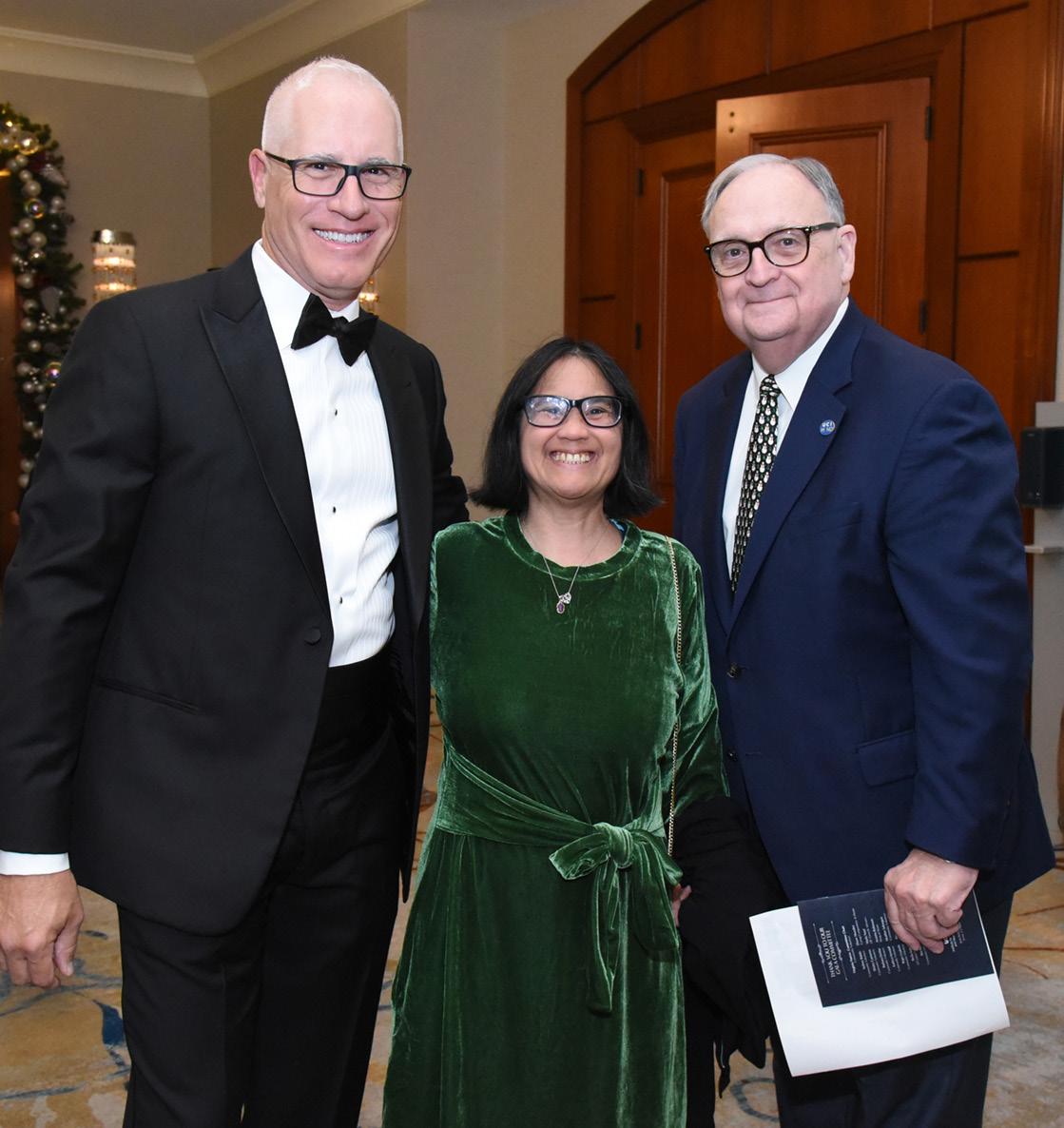
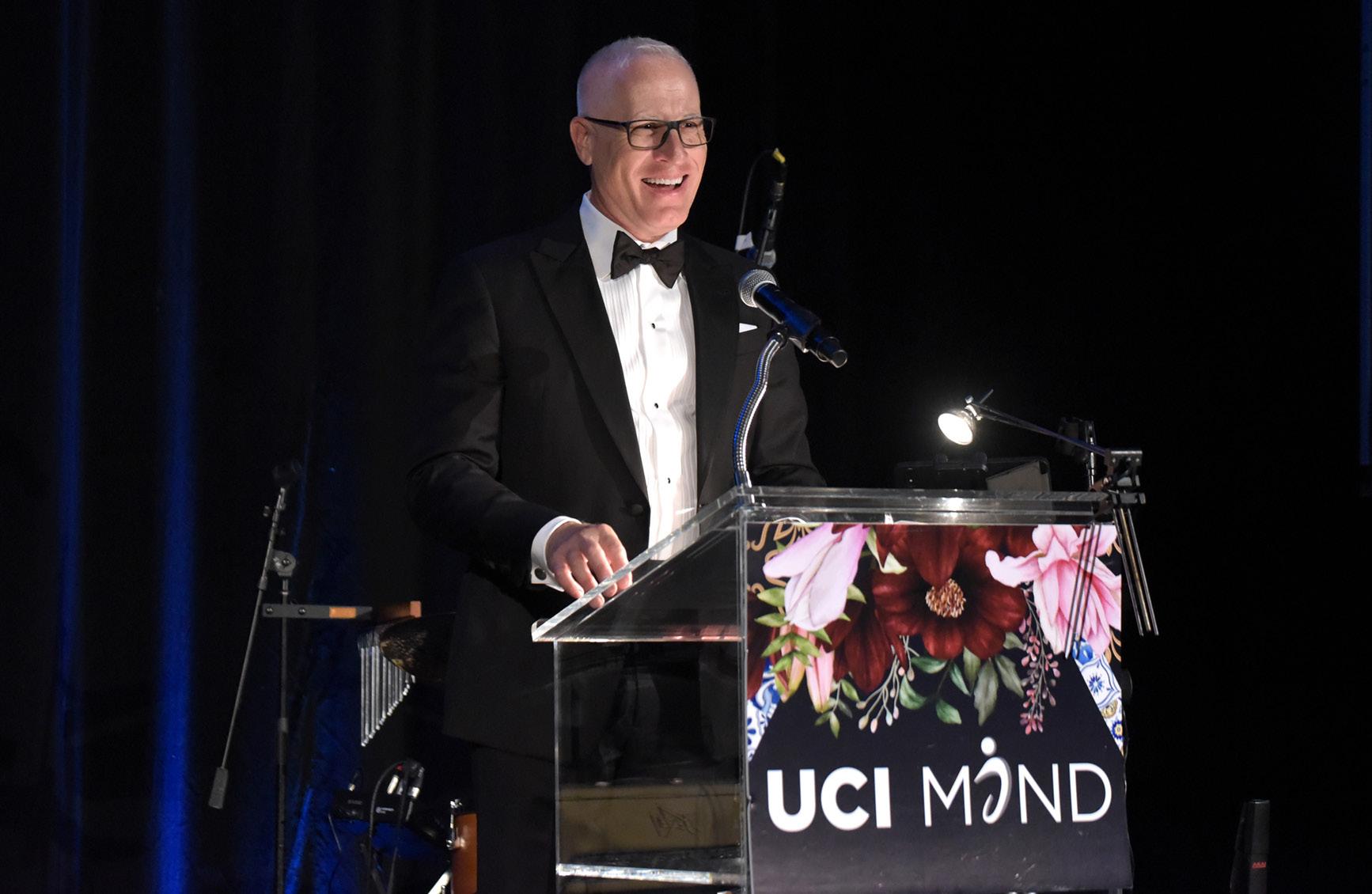
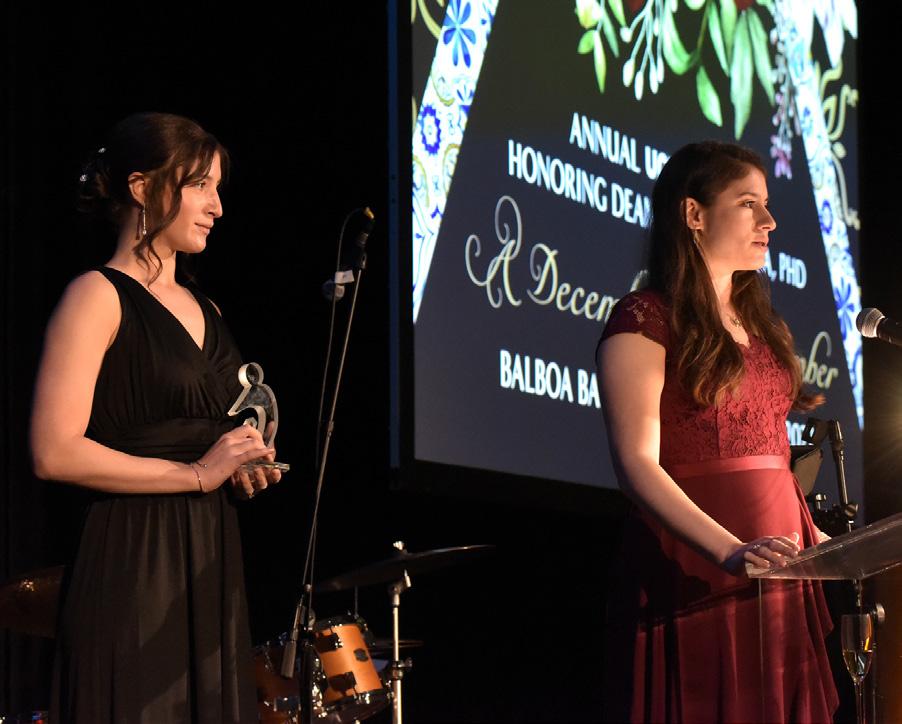







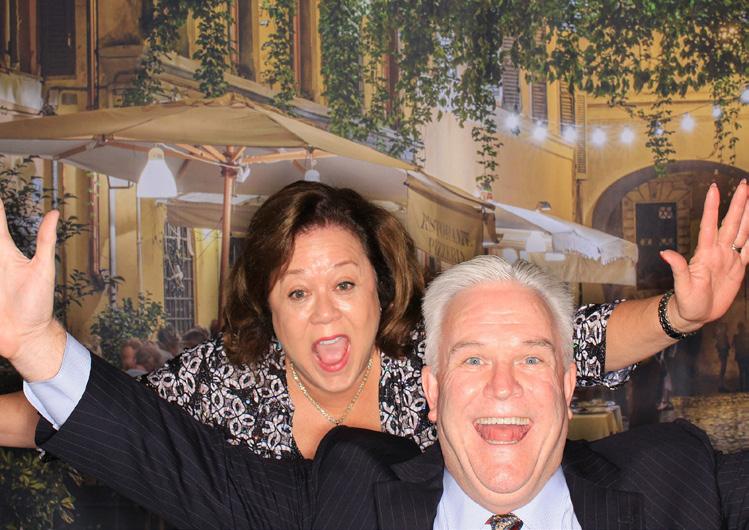
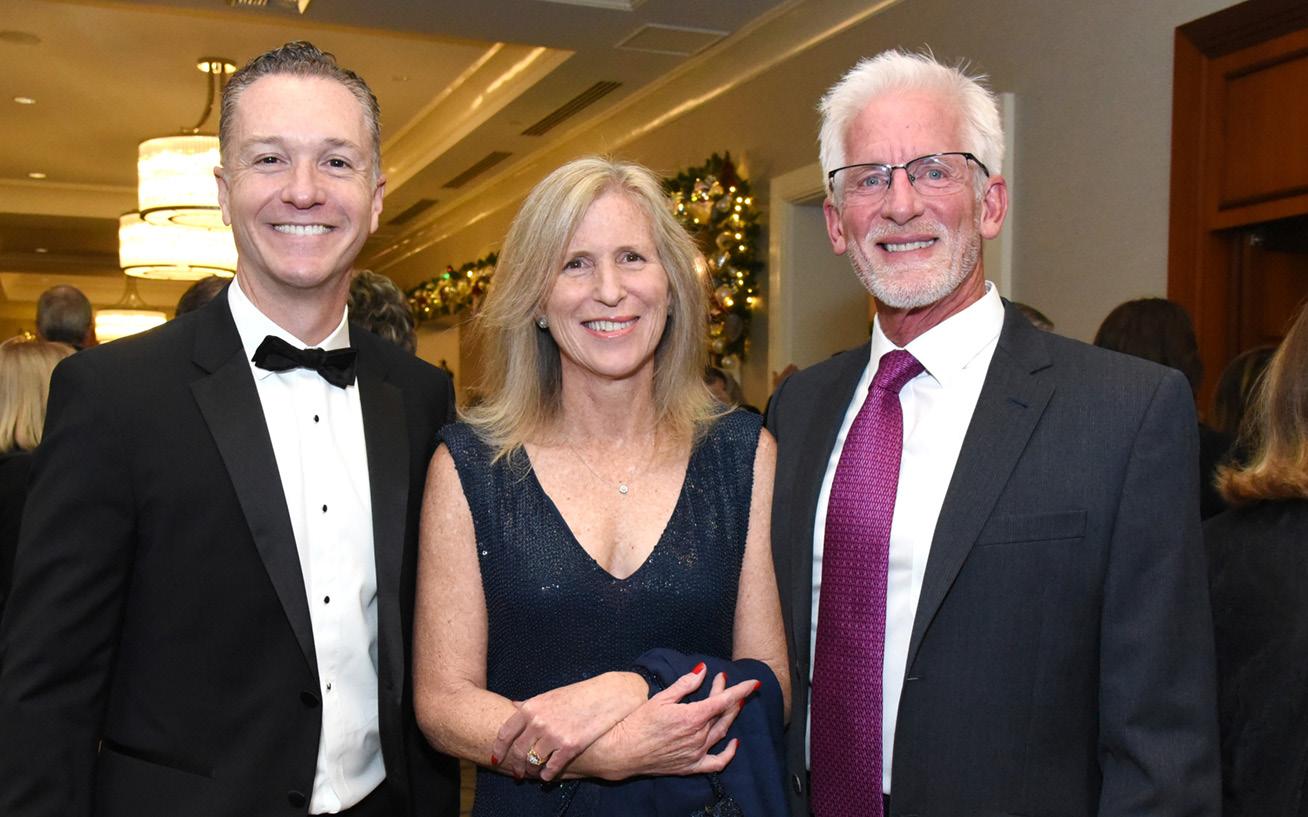
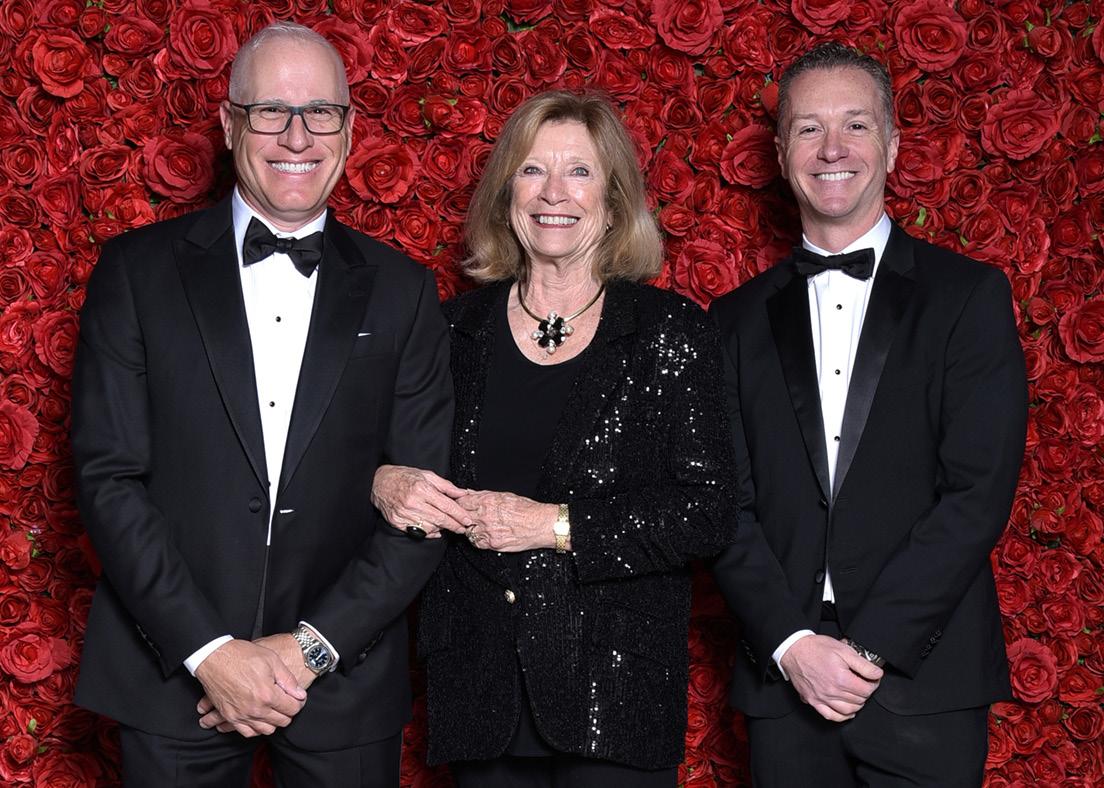
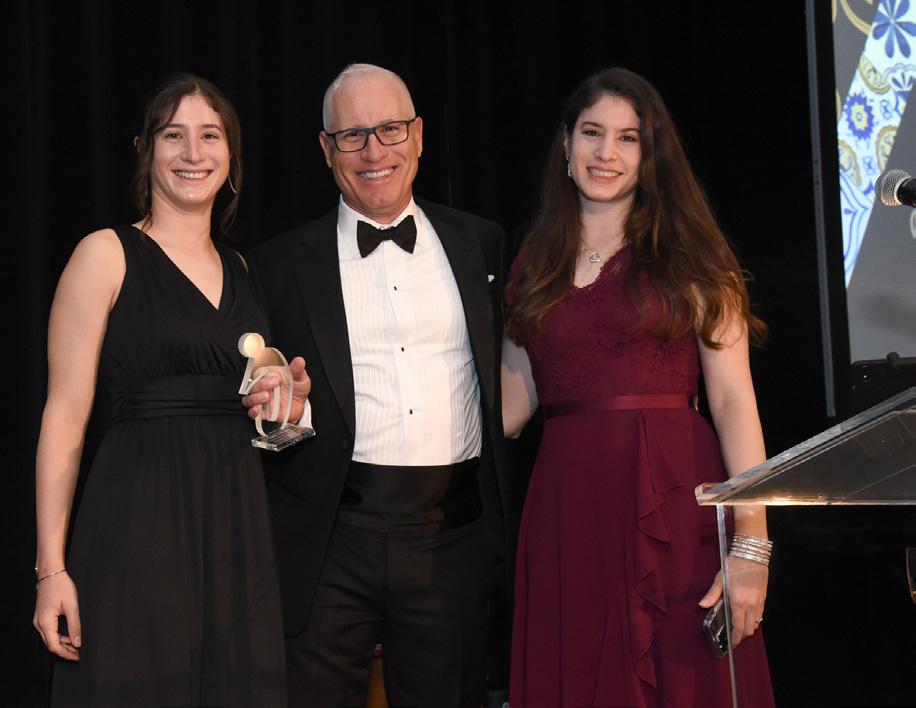






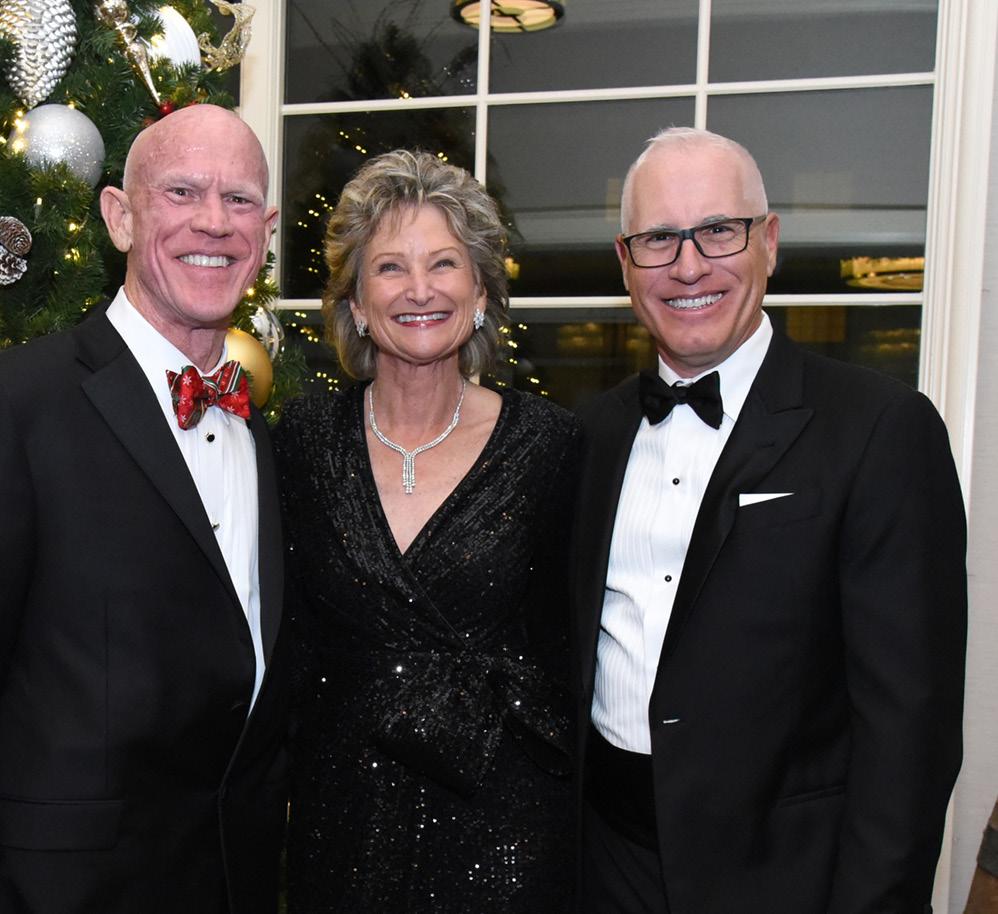

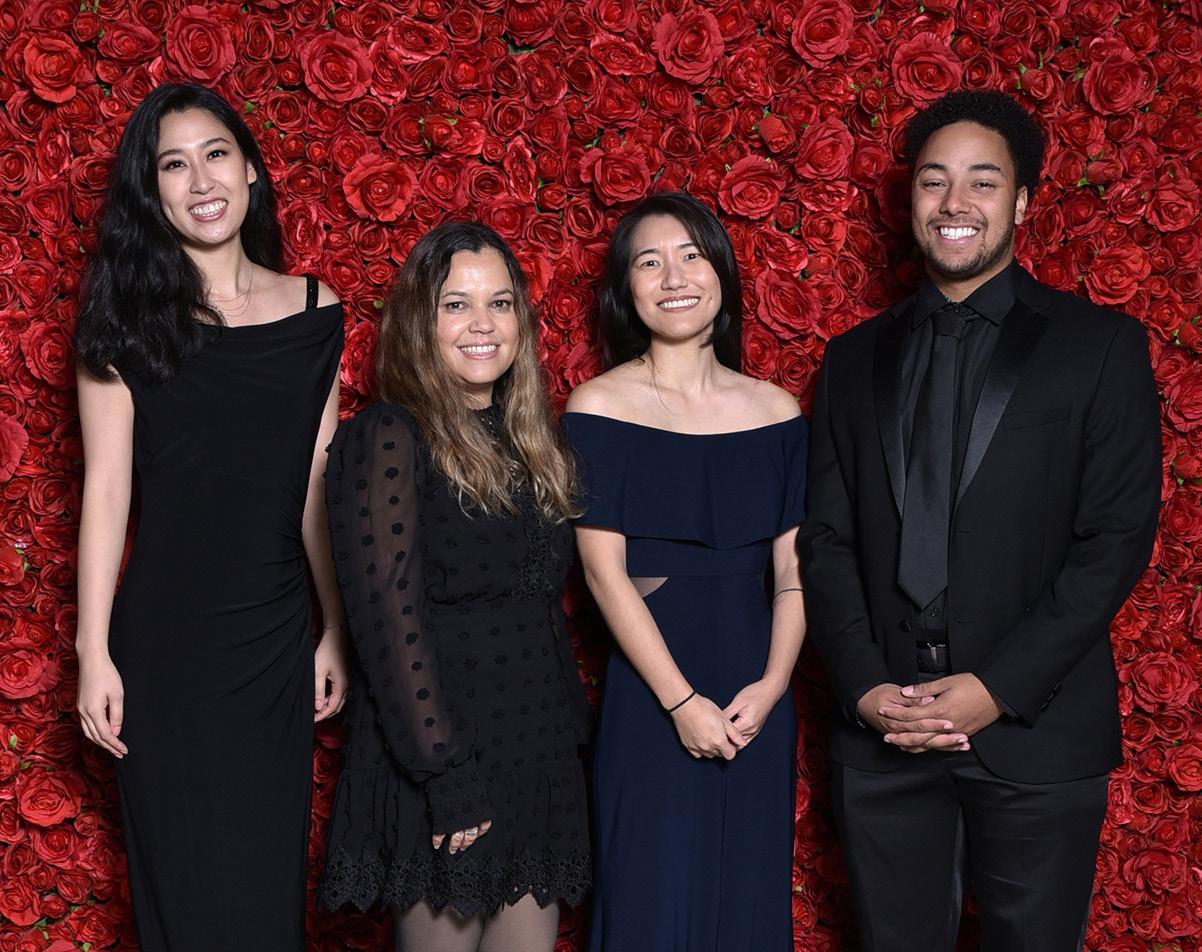
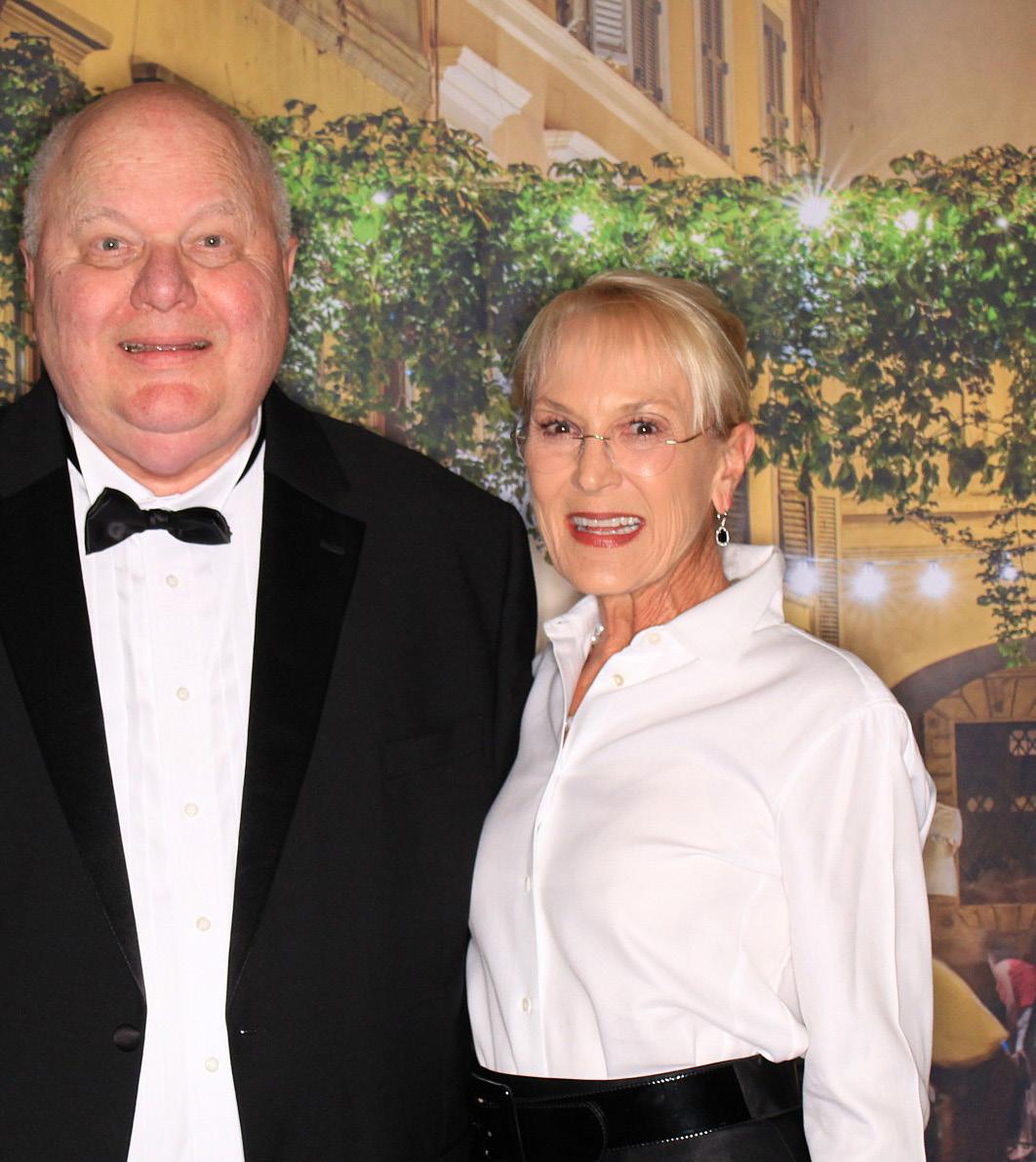
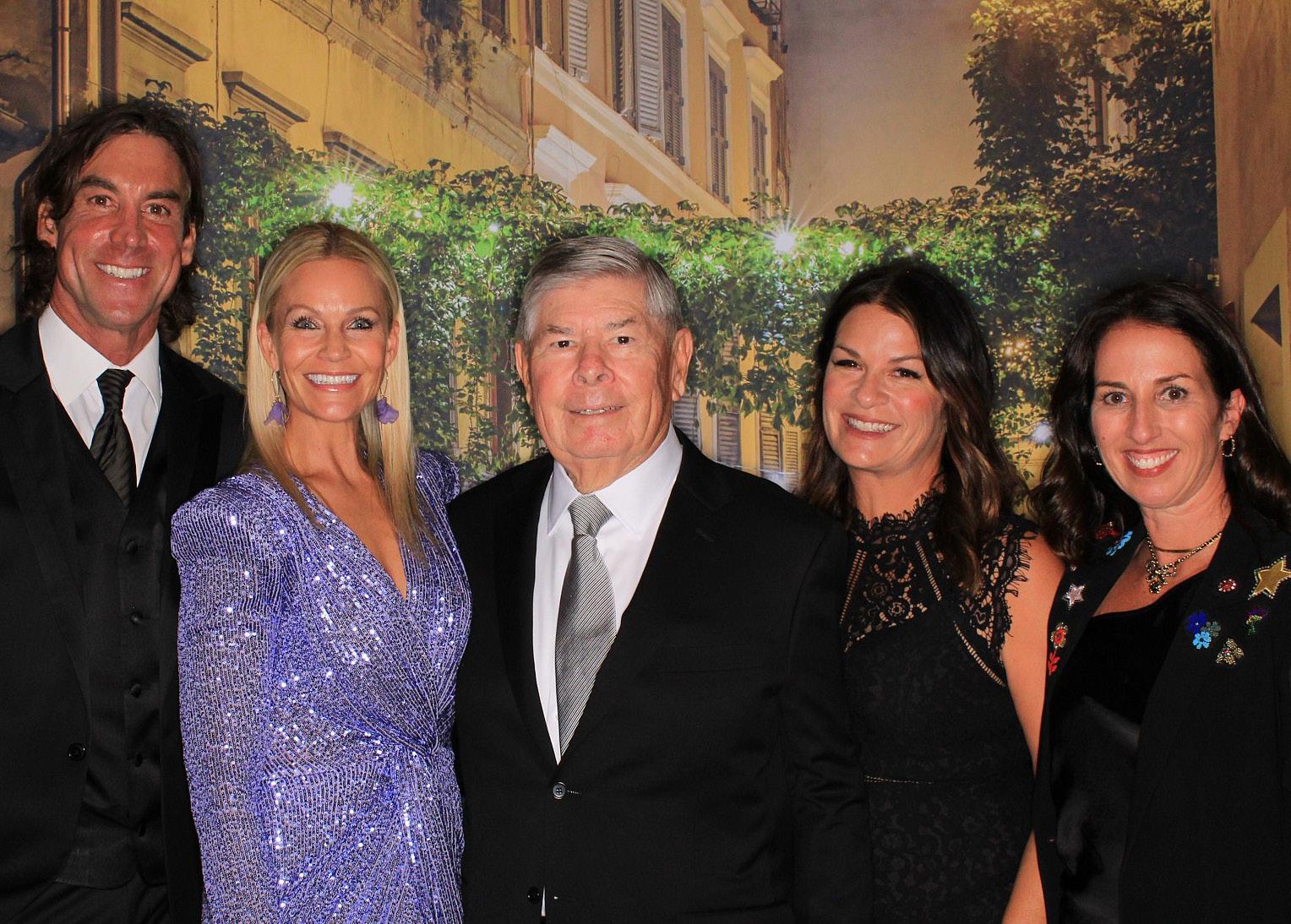

A December to Remember 2023 Gala SAVE THE DATE DEC 2023 09 SAT
To make a gift, call 949.824.3251 or visit mind.uci.edu/donate
Funding to Support the Next Generation of Scientists


Increased annual support from Joan and Don Beall will fund two important education and training programs at UCI MIND. The Beall Scholar Program is a free summer neuroscience course for diverse 11th graders from Orange County that was launched in 2021. The program exposes students to research in brain science and covers transportation, materials and food and provides students with a $500 stipend. The program is run by the trainee led Research and Education for Memory Impairments and Neurological Disorders (REMIND).
The funding will also establish the Joan and Don Beall Scholar Award, a funding opportunity for early career investigators at UCI studying ADRD. The award was announced this year and will provide $50,000 per year for 5 years to support the research endeavors of an outstanding assistant or associate professor at UCI. The award funds will help early career researchers establish an ADRD research program.
With this in mind, the Blurton-Jones lab explored ways to replace damaged microglial cells in the brain with healthy ones. Using CRISPR technology in human-derived induced pluripotent stem cells (iPS), they created new healthy microglia that carry a specific mutation to resist a drug called Plexxikon, a CSF1R inhibitor. These new cells were transplanted into the brains of young mice that were later treated with this drug, so that the native microglia died off and were readily replaced by the new resistant microglia. These new microglia can perform normal functions in the brain and persist for months, offering a possible new approach to not only replace diseased
Putting your cells to work:
To learn more about research, visit mind.uci.edu or call 949.824.0008

microglia but also engineer microglia to deliver therapeutics in the brain. The research is being lauded by many in the field as a breakthrough discovery in cell replacement therapy, which will no doubt open the door for future research, including understanding how these mutated microglia respond in AD.
To learn more about this research, read the full article in the December 2022 issue of the Journal of Experimental Medicine or watch the recent MINDcast episode of Accelerating Discovery, with lead author and graduate student, Jean Paul Chadarevian.
6 // mind.uci.edu
TRAINING AND EDUCATION
continued from page 1: Microglia replacement as a future treatment for neurodegenerative diseases?
Skin specimens taken from participants enrolled in our ADRC longitudinal study are collected and turned into induced pluripotent stem cells and used in studies like this one. Dr. Mathew Blurton-Jones and his team maintain a repository of stem cell lines that are shared broadly for research studies.
A Beall Scholar examining a human brain. (left)
Meet Milagros Rangel and Malia Tano:
Milagros Rangel:
Milagros will serve as the Alzheimer's disease research center (ADRC) and clinical trial recruitment coordinator. She has a bachelor’s degree in Community Health from Cal State Dominguez Hills and was previously employed as a population health coordinator. She is a native Spanish speaker and looks forward to learning more about clinical research, cognitive impairment, and providing health education to all including to the Spanish speaking communities of OC.
Malia Tano:
Malia joined UCI MIND as an administrative specialist. She will manage administrative duties for the Institute. Malia holds a bachelor’s degree in business, hotel and restaurant management from Northern Arizona University and has extensive experience working in the hotel industry. She looks forward to assisting the staff and faculty as well as learning more about the research being done in UCI MIND


Research Opportunity for Adults with Down Syndrome
Lifespan Approach to Alzheimer's Disease in Down Syndrome
Researchers at UC Irvine, under the direction of Dr. Ira T. Lott, are seeking volunteers for a research study. The purpose of this research project is to gather information across several age periods that will provide information regarding risk and prevention factors, early detection, and potential therapeutic pathways.

Participation in this study requires annual visits and consists of:

• Medical evaluations including medical history, neurologic and physical exams
• Cognitive testing to measure memory, thinking and functional skills
• Questionnaires to assess abilities, characteristics and habits

• A blood draw
• An optional brain MRI (If willing and qualified)
To be eligible, study volunteers with Down syndrome must be:
• 18 years or above and
• Have a study partner who knows them well
To learn more about research, email: downsyndrome@uci.edu or call 714.456.8443
Individuals with Down syndrome are at high risk of developing Alzheimer’s-type dementia over age 40 years.
STAFF SPOTLIGHT
MIND Matters // 7 STUDY SPOTLIGHT
Institute for Memory Impairments and Neurological Disorders

2643 Biological Sciences III

Irvine, CA 92697-4545
National Institute on Aging Designated Alzheimer’s Disease Research Center

This newsletter is supported in part by the California Department of Public Health, Alzheimer’s Disease Program. Funding is pursuant to California Health and Safety Code Section 125275 – 125285.



CONTACT US
General Information mind.uci.edu
ucimind@uci.edu
Giving Opportunities
949.824.3251
Lscheck@uci.edu
Education & Outreach
949.824.9896 mwitbrac@uci.edu

Research Participation
949.824.0008 research@mind.uci.edu
Connect with us on social media!
Scan

UPCOMING EVENTS
Save the Date
Annual UCI MIND Gala 2023
Saturday, December 9th, 2023
UCI MIND | gala.mind.uci.edu
Ask the Doc Video Series
Guest Experts from UCI MIND
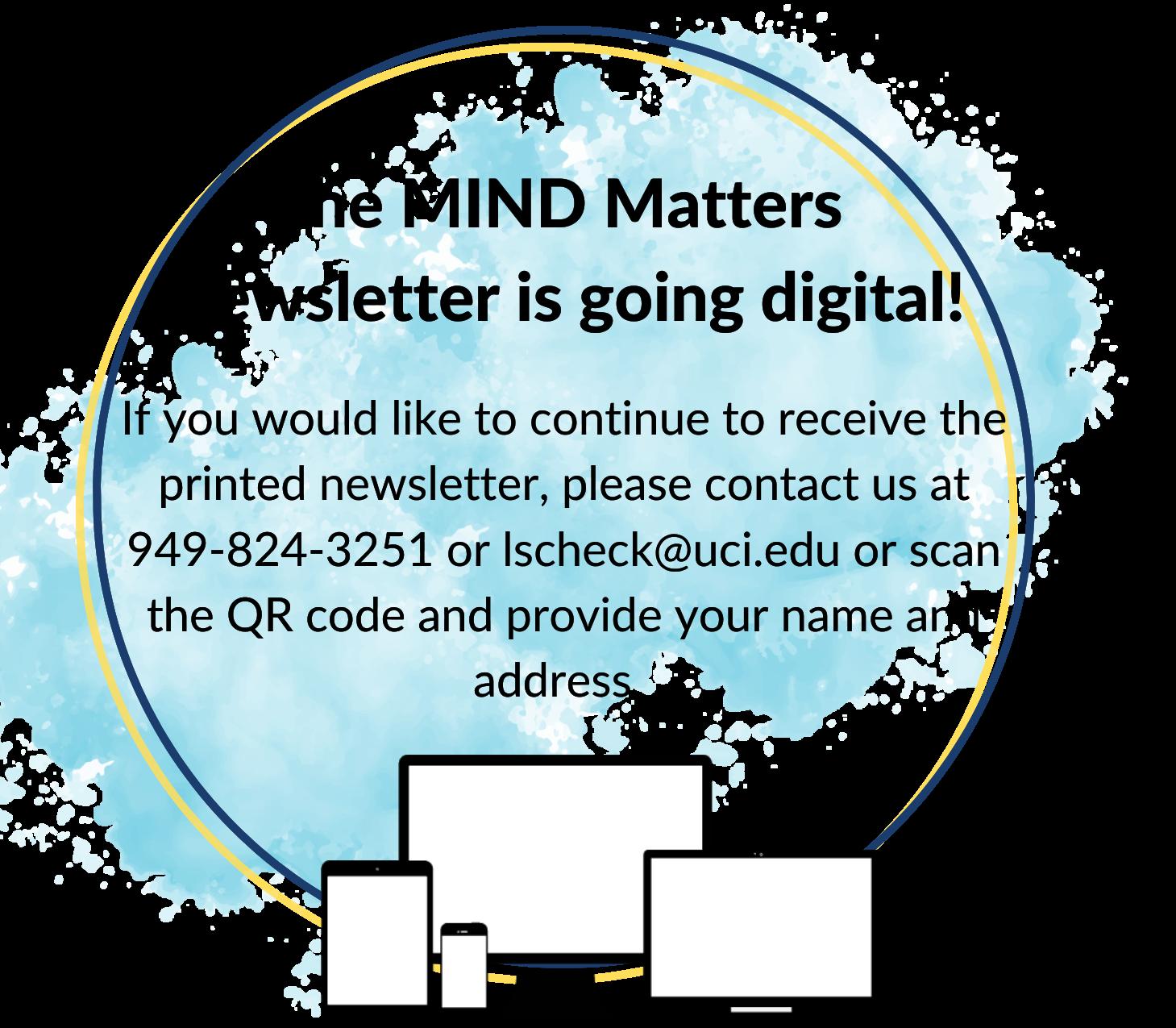
New Episodes Monthly
UCI MINDcast | mind.uci.edu/mindcast
Spotlight on Care Podcast Series
Steve O’Leary, Virginia Naeve, & Guests
New Episodes Regularly
UCI MINDcast | spotlightoncare.com
Past education sessions are archived on UCI MINDcast and youtube.com/ucimind

DONATE
the QR code for printed newsletter!











































































































